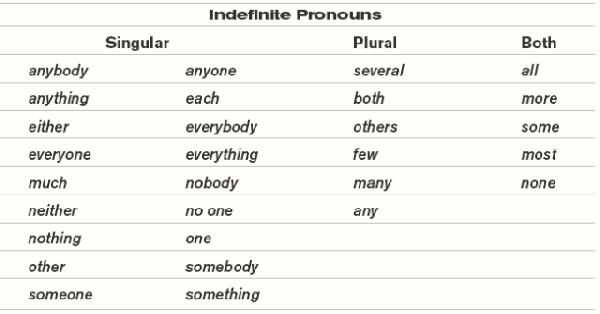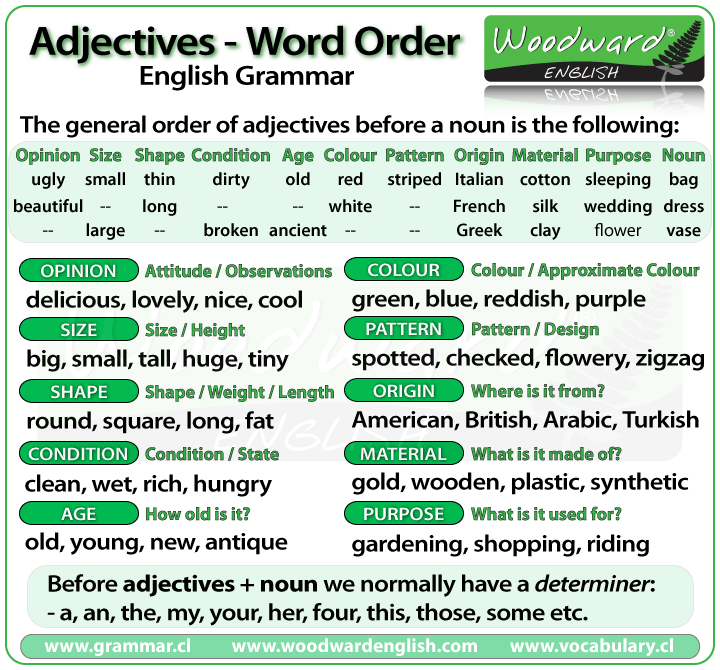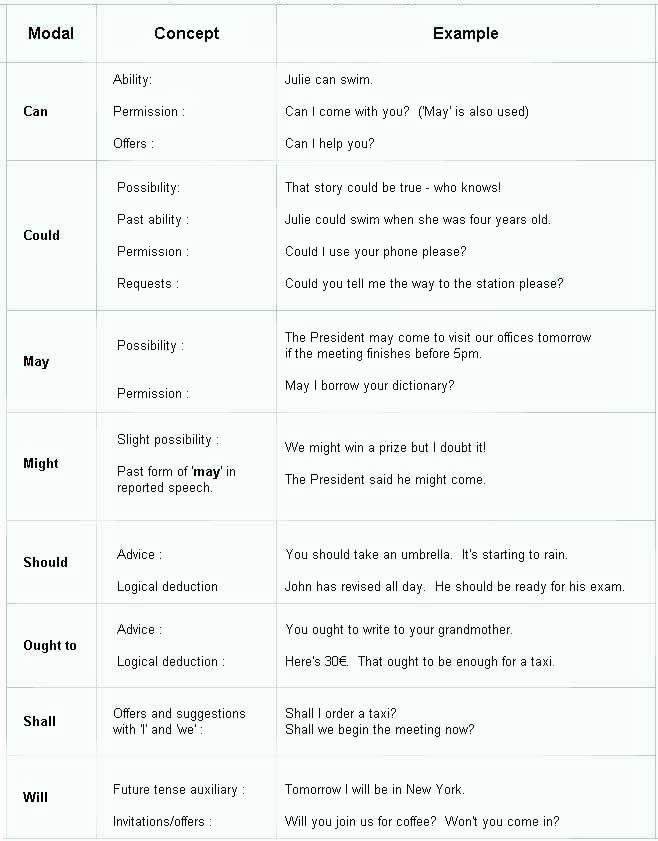Examples with Modals Verbs
Modal verb definition
The following list are all modal verbs. Modal verbs are also sometimes called modals.
They are used before ordinary verbs and are used to express meanings such as permission, possibility, certainty and necessity.
Need and dare can be used as like modal verbs
Can
Be able to
Can't
Could
May
Might
Must
|
Have to
Need to
Needn't
Musn't
Don't have to
Should
Ought to
|
Modal verbs examples and meaning
EXAMPLES AND USES
YES/NO QUESTION
| auxiliary verb | subject | main verb |
Answer
Yes or No
| |
| Do | you | want | dinner? | Yes, I do. |
| Can | you | drive? | No, I can't. | |
| Has | she | finished | her work? | Yes, she has. |
| Did | they | go | home? | No, they didn't. |
| Exception! verb be simple present and simple past | ||||
| Is | Anne | French? | Yes, she is. | |
| Was | Ram | at home? | No, he wasn't. | |

Yes/No questions - be (am, are, is)
Example: No, I am not - No, I'm not.
| Are | you | from Germany? | Yes, | I | am. |
| No, | I | am not. 'm not. | |||
| Is | he | your friend? | Yes, | he | is. |
| Are | Peter and John | from England? | Yes, | they | are. |

WH QUESTIONS
| Question Word | Function | Example |
|---|---|---|
| what | asking for information about something | What is your name? |
| asking for repetition or confirmation | What? I can't hear you. You did what? | |
| what...for | asking for a reason, asking why | What did you do that for? |
| when | asking about time | When did he leave? |
| where | asking in or at what place or position | Where do they live? |
| which | asking about choice | Which colour do you want? |
| who | asking what or which person or people (subject) | Who opened the door? |
| whom | asking what or which person or people (object) | Whom did you see? |
| whose | asking about ownership | Whose are these keys? Whose turn is it? |
| why | asking for reason, asking what...for | Why do you say that? |
| why don't | making a suggestion | Why don't I help you? |
| how | asking about manner | How does this work? |
| asking about condition or quality | How was your exam? | |
| how + adj/adv | asking about extent or degree | see examples below |
| how far | distance | How far is Pattaya from Bangkok? |
| how long | length (time or space) | How long will it take? |
| how many | quantity (countable) | How many cars are there? |
| how much | quantity (uncountable) | How much money do you have? |
| how old | age | How old are you? |
| how come (informal) | asking for reason, asking why | How come I can't see her? |
Examples with (Nobody, never)
Negative (Nobody, never etc)
Below you will find a list of the most common negative words. They can refer to people or things and are usually used in conjunction with "no."
Examples
- There is nobody in this club.
- Do you eat spinach? No, I never eat spinach.
- Nobody with any sense isn’t going
- I can’t find my keys nowhere.
- She never goes with nobody.
- John says he has not seen neither Alice or Susan all day.
- You can’t see no one in this crowd.
- There aren’t no presents left to open.
- The secret cave did not have none of the treasures they wanted.
- All the witnesses claimed that didn’t see nothing.
- The pilot can’t find no place to land.
- He did not mention neither the deposit nor the rate.
- There is no way you can do nothing about this.
- He doesn’t have nothing but the clothes on his back.
- We haven’t never seen a tornado that big.
INDEFINITIVES
Examples:
- I needed to see if anyone was interested in dating my cousin.
- Someone really needs to come and mow my lawn.
- Is anyone available to babysit for me on Tuesday?
- My parents always told me that anything is possible.
- Everyone enjoyed the food and the company.
- Anyone that has ever lived in the city will never take for granted the peace of the country.
- Someone whispered in my ear, but when I turned around there was not anybody there.
- Few came to the wedding after the bride had a melt down and lashed out at her family and friends.
- Everyone at the wedding could see how happy he made her.
- After the festivities, everyone was invited back to the house for the after-party.
- Some just do not know when to quit while they are ahead.
- Someone should sue the pants off of that guy!
- Anything is possible as long as you put your mind to it.
- Mary wanted some, but I do not have any.
- Someone drank all the soda.
- Can anyone tell me why it is raining again?
- Everybody loves to eat chocolate.
- No one likes to eat vegetables.
- Someone will clean up the kitchen.
- No one was home at the neighbor's.
- Everyone brought canned goods to the charity drive.

ORDER ADJECTIVE



No hay comentarios:
Publicar un comentario